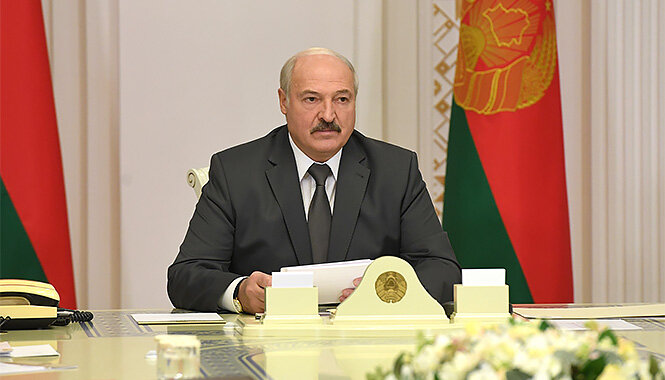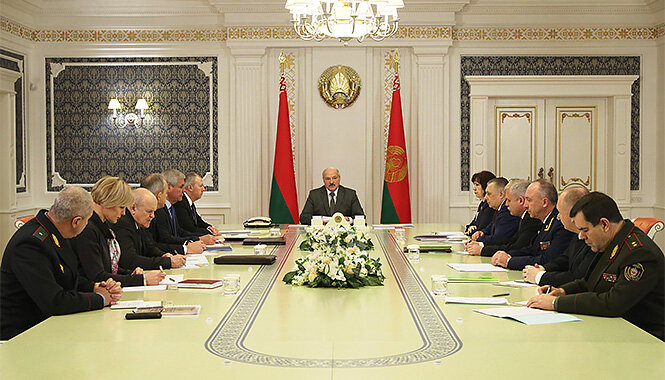Session to discuss the application of administrative measures
- 1
Belarus
President Aleksandr Lukashenko hosted a meeting on 16 December to
discuss the application of administrative measures.
The head of state noted that this important topic concerns all citizens. “Does this work fully ensure justice which we often talk about and which our people view as very important ?" he asked.
According to the President, the number of administrative violations has almost doubled over the past ten years. A total of 16 million violations have been registered over the past five years. Some 3.5 million people have been held responsible. This is more than 50% of the country’s total workforce.
“We need to look into these figures and, of course, take action,” Aleksandr Lukashenko said.
Traffic violations, including those registered with the help of modern technology, make the bulk of administrative violations (over 80%) today. “I believe that virtually every motorist has got at least one traffic fine,” the President said.
In his words, photographic evidence was introduced seven years ago to ensure order on roads. “Very often violations are caused by busy roads, the insufficient number of parking lots, and other objective reasons,” the head of state said.
Aleksandr Lukashenko stressed that it is necessary to take a careful look into the situation and improve optimal conditions to encourage people to obey the traffic law. “A person cannot be labeled a violator when no good traffic conditions are created. We need to ease the traffic on the roads where the biggest number of violations is registered, increase the number of parking lots, place speed limit signs where there is an objective need for them,” the President said.

The next important issue is the use of gross reporting indicators to assess the performance of officials. “As I have been informed, we still have not eradicated the practice of departmental quotas. Almost every agency follows this practice: police, customs, tax authorities, fire service, hygienic and sanitary service and others. It comes to the point that senior officials instruct their employees to draw up at least three or five protocols on offenses per day. Otherwise they will get no bonuses. This is unacceptable. This should land people in prison without trial. Otherwise, we will not eradicate this problem,” the President is convinced.
Sometimes the workers themselves show excessive zeal in the hope of distinguishing themselves, the head of state added. He said he still has a lot of questions to the police in this regard. “We discussed this in August, at a meeting on the quality of law enforcement agencies' performance,” Aleksandr Lukashenko recalled. "This is why I am waiting for the results, and not just from the police.”
Officers from more than 70 agencies have the right to draw up reports establishing offences. The President stressed that everyone should clearly understand that the main criterion of work is not the number of violations and fines issued, but the preventive impact and real reduction in the number of administrative offenses.
He noted that the current Code on Administrative Offences applies a predominantly punitive approach to resolve any conflict situation, as was the case in Soviet times. “The public perceives it as excessive strictness and even cruelty of the authorities, and often the obvious unfairness of the practice of applying administrative sanctions,” Aleksandr Lukashenko said.
For the 12 years that the Code on Administrative Offences has been in force, Belarus has passed 115 laws and introduced more than 1,400 amendments. This devalues the respect for the law, the President believes. In his opinion, it is important to ensure the stability of administrative legislation, to implement proactive measures to prevent wrongdoing.
The head of state previously instructed to set up a special expert commission of heads of governments bodies, MPs and scholars to review the current legislation and prepare a comprehensive document to improve administrative proceedings.

The head of state noted that this important topic concerns all citizens. “Does this work fully ensure justice which we often talk about and which our people view as very important ?" he asked.
According to the President, the number of administrative violations has almost doubled over the past ten years. A total of 16 million violations have been registered over the past five years. Some 3.5 million people have been held responsible. This is more than 50% of the country’s total workforce.
“We need to look into these figures and, of course, take action,” Aleksandr Lukashenko said.
Traffic violations, including those registered with the help of modern technology, make the bulk of administrative violations (over 80%) today. “I believe that virtually every motorist has got at least one traffic fine,” the President said.
In his words, photographic evidence was introduced seven years ago to ensure order on roads. “Very often violations are caused by busy roads, the insufficient number of parking lots, and other objective reasons,” the head of state said.
Aleksandr Lukashenko stressed that it is necessary to take a careful look into the situation and improve optimal conditions to encourage people to obey the traffic law. “A person cannot be labeled a violator when no good traffic conditions are created. We need to ease the traffic on the roads where the biggest number of violations is registered, increase the number of parking lots, place speed limit signs where there is an objective need for them,” the President said.
The
head of state also recalled his instructions on road traffic,
especially, the ones on the Minsk ring roads. “Take one more look at my
instructions with regard the first and second ring roads and check if
they have been fulfilled. Progress has been made on parts of the road I
use, and speed limits have been adjusted. Nothing, however, has changed
on the road I use less frequently,” Aleksandr Lukashenko said.

The next important issue is the use of gross reporting indicators to assess the performance of officials. “As I have been informed, we still have not eradicated the practice of departmental quotas. Almost every agency follows this practice: police, customs, tax authorities, fire service, hygienic and sanitary service and others. It comes to the point that senior officials instruct their employees to draw up at least three or five protocols on offenses per day. Otherwise they will get no bonuses. This is unacceptable. This should land people in prison without trial. Otherwise, we will not eradicate this problem,” the President is convinced.
Sometimes the workers themselves show excessive zeal in the hope of distinguishing themselves, the head of state added. He said he still has a lot of questions to the police in this regard. “We discussed this in August, at a meeting on the quality of law enforcement agencies' performance,” Aleksandr Lukashenko recalled. "This is why I am waiting for the results, and not just from the police.”
Officers from more than 70 agencies have the right to draw up reports establishing offences. The President stressed that everyone should clearly understand that the main criterion of work is not the number of violations and fines issued, but the preventive impact and real reduction in the number of administrative offenses.
He noted that the current Code on Administrative Offences applies a predominantly punitive approach to resolve any conflict situation, as was the case in Soviet times. “The public perceives it as excessive strictness and even cruelty of the authorities, and often the obvious unfairness of the practice of applying administrative sanctions,” Aleksandr Lukashenko said.
For the 12 years that the Code on Administrative Offences has been in force, Belarus has passed 115 laws and introduced more than 1,400 amendments. This devalues the respect for the law, the President believes. In his opinion, it is important to ensure the stability of administrative legislation, to implement proactive measures to prevent wrongdoing.
The head of state previously instructed to set up a special expert commission of heads of governments bodies, MPs and scholars to review the current legislation and prepare a comprehensive document to improve administrative proceedings.
“We
should make sure that we do no not amend the legislation for at least
the next five years. I expect the relevant bill on my desk by July 2020
to get it finalized and submitted to Parliament. Today, however, I
expect the meeting participants to report on the state of affairs in the
application of administrative measures and to submit concrete proposals
to resolve the problems. The results of the meeting will form the basis
of the work of the expert commission,” the President noted.

